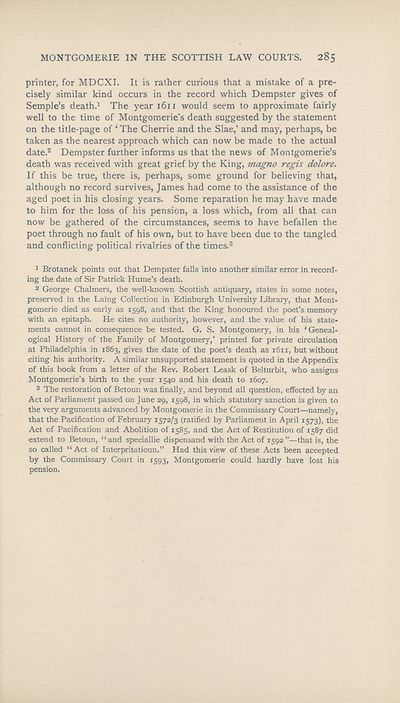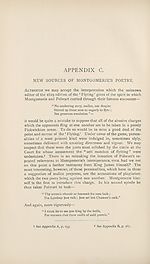Download files
Complete book:
Individual page:
Thumbnail gallery: Grid view | List view

MONTGOMERIE IN THE SCOTTISH LAW COURTS. 285
printer, for MDCXI. It is rather curious that a mistake of a pre¬
cisely similar kind occurs in the record which Dempster gives of
Semple’s death.1 The year 1611 would seem to approximate fairly
well to the time of Montgomerie’s death suggested by the statement
on the title-page of ‘The Cherrie and the Slae,’ and may, perhaps, be
taken as the nearest approach which can now be made to the actual
date.2 Dempster further informs us that the news of Montgomerie’s
death was received with great grief by the King, magno regis dolore.
If this be true, there is, perhaps, some ground for believing that,
although no record survives, James had come to the assistance of the
aged poet in his closing years. Some reparation he may have made
to him for the loss of his pension, a loss which, from all that can
now be gathered of the circumstances, seems to have befallen the
poet through no fault of his own, but to have been due to the tangled
and conflicting political rivalries of the times.3
1 Brotanek points out that Dempster falls into another similar error in record¬
ing the date of Sir Patrick Hume’s death.
2 George Chalmers, the well-known Scottish antiquary, states in some notes,
preserved in the Laing Collection in Edinburgh University Library, that Mont¬
gomerie died as early as 1598, and that the King honoured the poet’s memory
with an epitaph. He cites no authority, however, and the value of his state¬
ments cannot in consequence be tested. G. S. Montgomery, in his ‘Geneal¬
ogical History of the Family of Montgomery,’ printed for private circulation
at Philadelphia in 1863, gives the date of the poet’s death as 1611, but without
citing his authority. A similar unsupported statement is quoted in the Appendix
of this book from a letter of the Rev. Robert Leask of Belturbit, who assigns
Montgomerie’s birth to the year 1540 and his death to 1607.
3 The restoration of Betoun was finally, and beyond all question, effected by an
Act of Parliament passed on June 29, 1598, in which statutory sanction is given to
the very arguments advanced by Montgomerie in the Commissary Court—namely,
that the Pacification of February 1572/3 (ratified by Parliament in April 1573), the
Act of Pacification and Abolition of 1585, and the Act of Restitution of 1587 did
extend to Betoun, “and speciallie dispensand with the Act of 1592”—that is, the
so called “ Act of Interpritatioun.” Had this view of these Acts been accepted
by the Commissary Court in 1593, Montgomerie could hardly have lost his
pension.
printer, for MDCXI. It is rather curious that a mistake of a pre¬
cisely similar kind occurs in the record which Dempster gives of
Semple’s death.1 The year 1611 would seem to approximate fairly
well to the time of Montgomerie’s death suggested by the statement
on the title-page of ‘The Cherrie and the Slae,’ and may, perhaps, be
taken as the nearest approach which can now be made to the actual
date.2 Dempster further informs us that the news of Montgomerie’s
death was received with great grief by the King, magno regis dolore.
If this be true, there is, perhaps, some ground for believing that,
although no record survives, James had come to the assistance of the
aged poet in his closing years. Some reparation he may have made
to him for the loss of his pension, a loss which, from all that can
now be gathered of the circumstances, seems to have befallen the
poet through no fault of his own, but to have been due to the tangled
and conflicting political rivalries of the times.3
1 Brotanek points out that Dempster falls into another similar error in record¬
ing the date of Sir Patrick Hume’s death.
2 George Chalmers, the well-known Scottish antiquary, states in some notes,
preserved in the Laing Collection in Edinburgh University Library, that Mont¬
gomerie died as early as 1598, and that the King honoured the poet’s memory
with an epitaph. He cites no authority, however, and the value of his state¬
ments cannot in consequence be tested. G. S. Montgomery, in his ‘Geneal¬
ogical History of the Family of Montgomery,’ printed for private circulation
at Philadelphia in 1863, gives the date of the poet’s death as 1611, but without
citing his authority. A similar unsupported statement is quoted in the Appendix
of this book from a letter of the Rev. Robert Leask of Belturbit, who assigns
Montgomerie’s birth to the year 1540 and his death to 1607.
3 The restoration of Betoun was finally, and beyond all question, effected by an
Act of Parliament passed on June 29, 1598, in which statutory sanction is given to
the very arguments advanced by Montgomerie in the Commissary Court—namely,
that the Pacification of February 1572/3 (ratified by Parliament in April 1573), the
Act of Pacification and Abolition of 1585, and the Act of Restitution of 1587 did
extend to Betoun, “and speciallie dispensand with the Act of 1592”—that is, the
so called “ Act of Interpritatioun.” Had this view of these Acts been accepted
by the Commissary Court in 1593, Montgomerie could hardly have lost his
pension.
Set display mode to: Large image | Zoom image | Transcription
Images and transcriptions on this page, including medium image downloads, may be used under the Creative Commons Attribution 4.0 International Licence unless otherwise stated. ![]()
| Publications by Scottish clubs > Scottish Text Society publications > Old series > Poems of Alexander Montgomerie > (366) |
|---|
| Permanent URL | https://digital.nls.uk/110174441 |
|---|
| Description | A collection of over 100 Scottish texts dating from around 1400 to 1700. Most titles are in Scots, and include editions of poetry, drama, and prose by major Scottish writers such as John Barbour, William Dunbar, Gavin Douglas, and George Buchanan. Edited by a key scholarly publisher of Scotland's literary history, and published from the late 19th century onwards by the Scottish Text Society. Available here are STS series 1-3. |
|---|

